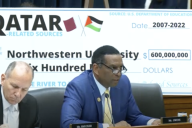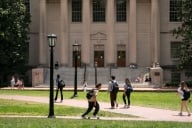You have /5 articles left.
Sign up for a free account or log in.
Two large state systems will be bringing institutions from all over the country to learn from each other on disaster preparedness and response, taking examples from Hurricane Maria, which hit Puerto Rico in 2017, with the goal of pulling knowledge together and moving forward collectively.
The State University of New York and City University of New York systems worked together two years ago in Puerto Rico after the deadliest hurricane in the island's history struck. Organizers note that with a changing climate and demographics, disaster preparedness is timely.
The event, RISE 2019: Transforming University Engagement in Pre- and Post-Disaster Environments: Lessons from Puerto Rico, will be held Nov. 18 to 20 and hosted by the University at Albany. The conference will show what SUNY and CUNY learned from Maria and how the systems led by example by working with local governments, organizations, communities and institutions of higher education.
“Both CUNY and SUNY, two large systems within the state of New York, came together, and we said, ‘What is it that we can do collectively, what is it that we can do to help the people of Puerto Rico recover from this event,’” said University at Albany president Havidán Rodríguez. “What is it that we can do together, and how is it that it can be done and how effective and impactful it will be not only for the victims of the hurricanes but even for those that are providing the services, especially our students?”
Rodríguez urged establishing collaborations through a series of partnerships that ensure they are long term and sustainable. He hopes that this conference will highlight how institutions can provide the resources, talent and tools that they have to help their communities locally, nationally and globally.
“We have a moral responsibility upon our institutions to think about systematically how it is that we deal and respond with those events," said Rodríguez, going on to say that institutions should establish policies and develop strategies for potential disasters now.
The national conference will include roughly 400 attendees from more than 100 higher education institutions, communities and organizations, as well as government officials, some of whom have experienced disasters firsthand, such as representatives from Puerto Rican universities.
“This is going to be, I hope pathbreaking for us as communities of higher education," said Rodríguez. "And if we can begin to think more systematically and holistically about how we prepare, respond and recover from disasters, I think we will have a significant impact moving forward, and that is the goal of higher education, right? To be impactful in our communities.”








